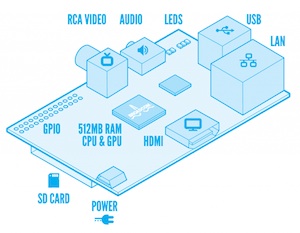Google Gives 15,000 Raspberry Pi Computer Boards to UK Students

The Raspberry Pi Model B computer board |
The Raspberry Pi Foundation has received a grant from Google Giving to provide students in the United Kingdom with 15,000 Raspberry Pi Model B computer boards for learning to program.
The Raspberry Pi Foundation is a charitable organization in the UK that develops the credit-card sized ARM processor-based computer boards. Students can connect an SD memory card, keyboard, mouse, and display, and then install Linux and learn to program the devices.
The Raspberry Pi Foundation, Google, and six UK educational partners will work together to identify the students who will receive the Raspberry Pi devices. The educational partners are CoderDojo, Code Club, Computing at School, Generating Genius, Teach First, and OCR.
The Raspberry Pi Foundation already offers a free Raspberry Pi Education Manual from Computing at School, which guides students through the process of learning to program the devices using the Scratch and Python programming languages, as well as how to use the Linux command line interface. As part of the Google Giving program, OCR will be creating 15,000 free teaching and learning packs to accompany the devices.
"This is a brilliant way for us to find kids all over the country whose aptitude for computing can now be explored properly," wrote a Raspberry Pi Foundation representative in a blog post. "We believe that access to tools is a fundamental necessity in finding out who you are and what you're good at. We want those tools to be within everybody's grasp, right from the start."
The Raspberry Pi devices are available in two models. The grant from Google will provide students with the higher-end Model B devices, which include 512 MB of RAM, two USB ports, and an Ethernet port. The Model A devices include 256 MB of RAM, one USB port, and no Eithernet port.
Further information about the Raspberry Pi computer boards can be found on the Raspberry Pi Foundation's site.
About the Author
Leila Meyer is a technology writer based in British Columbia. She can be reached at [email protected].